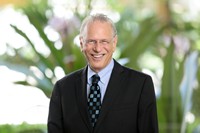By Steven G. Ullmann, PhD
The University of Miami Center for Health Management and Policy, housed at the Miami Herbert Business School, held its 11th annual health business conference. This year’s theme was “Technology, Access and the New Normal”. With over 1,000 registrants from across the region, as well as nationally and globally, the audience reflected the geographic and industry diversity of the panels themselves.
One of the strengths of this series of conferences is the representation and discussion between the different professional sectors of the healthcare industry. Representation from the C-suite included the American Hospital Association, American Health Insurance Plans, the Health Care Financial Management Association, the National Medical Association, and the American Nurses Association. Given the theme of the conference, significant discussions and insights came from attendees, moderated by Pat Geraghty, President and CEO of GuideWell – Florida Blue, the conference’s presenting sponsor since its inception. The panel focused on many issues that affect us in our local healthcare community. Particular attention was given to the shortage of manpower which affects the ability of health systems and physician groups to provide adequate and high quality care. The impact on labor costs and resulting overall costs of facilities and clinical practices, as well as the impact on net profits/revenues and financial viability of providers were discussed. Methods to alleviate the problem associated with labor shortage, including the high skill level required in our time, were also discussed. State-of-the-art simulation training (as exists at the UM School of Nursing and Health Sciences Hospital Simulation Facility), cross-training of clinical staff skills, and the use of intelligence to strengthen the delivery of care were seen as ways to improve the ability to provide adequate clinical care in the wake of current and ongoing clinical shortages. Telehealth was also discussed as a process that gained widespread acceptance during the height of the pandemic, particularly for primary care and behavioral health, and demonstrated the possibilities of extending service to underrepresented minorities, communities low income and rural areas. That said, several telehealth concerns were discussed. Concerns centered on whether people living in low-income or rural communities had video access or only audio access, whether due to web access or individual technical knowledge to connect visually . Additionally, the federally authorized refund is set to expire on December 31, 2022, and the question remains whether the current refund policy will continue.
Specific technologies were discussed in a second panel which focused on aspects of lifestyle and health with platforms and applications to moderate and implement healthy eating habits and support for behavioral health. More convenient access, focusing on access points, i.e. where the patient/client is, in terms of location, psychological status and social demographics, was discussed. The objective is to give the patient/client better control of his health condition with adequate support in real time.
The concept of access was highlighted during a discussion with Health and Human Services Secretary Alex Azar. Azar and Donna Shalala, former Secretaries of Health and Human Services, are both on the faculty of the Department of Health Management and Policy at the University of Miami. Perhaps the most critical medical issue of our lifetime, the pandemic, occurred under Secretary Azar’s watch. Given Secretary Azar’s experience in the C-suite of one of the nation’s leading pharmaceutical companies, Secretary Azar explained how his understanding of the risks associated with developing pharmaceuticals and vaccines, an understanding of the new methodologies such as mRNA vaccines and the significant problem associated with production, storage, transport and distribution, as well as the issue of distributive justice associated with an initially scarce supply with huge demand, required a team interdisciplinary team of experts to effectively implement Operation Warp Speed…deploy a new vaccine against this deadly disease within one year…truly a remarkable feat. Knowing that hundreds of thousands of people died, one can only imagine the multiple hospitalizations and deaths that would have occurred in the absence of Operation Warp Speed. Secretary Azar, in his discussion with Professor Karoline Mortensen, also focused on several of his other policy areas (until the pandemic demanded renewed attention). These other topics of discussion included the portability of medical records, price transparency, and value-based purchasing.
As this conference drew to a close, planning was already underway for the next healthcare business conference. We look forward to being fully in person again in the years to come, to discuss key areas of interaction in the future.
Dr. Steven G. Ullmann, Professor and Chair of the Department of Health Management and Policy, Director of the Center for Health Management and Policy, and Special Assistant to the Provost of Miami Herbert Business School, University of Miami, may be contacted at (305) 284-9920 or [email protected].
Post views:
128

